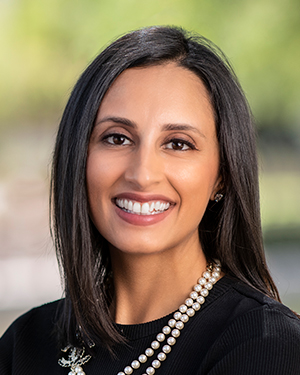Founded by long-time friends Anita Verma-Lallian and Smita Patil Mehta, the land investment and development company Equity Land Group focuses exclusively on the Phoenix metro area. To fund its land deals, it raises money from individuals and high-net-worth investors, placing particular attention on women investors.
Both Verma-Lallian and Mehta say they feel passionate about empowering women to invest and diversify their portfolios. They seek to educate women about the ins and outs of real estate investing, specifically investment in land.
Since 2020, Equity Land Group has raised and invested $15 million in land. Last month, it closed on three commercial sites totaling $10 million in the West Valley. The deal includes six acres in Glendale, Ariz., 10 acres in Litchfield Park, and seven acres in Buckeye along Interstate 10.
The Glendale property is located in close proximity to State Farm Stadium and the Westgate Entertainment District. The previous owner rezoned the land and installed infrastructure, which allows for a great deal of flexibility with land usage. A luxury apartment complex is planned for the adjacent property, as well as a mixed-use property across the street.
The Litchfield Park parcel will be surrounded by about 15,000 residential homes in the general area. Since there aren’t any gas stations, grocery stores, medical offices or other commercial buildings in the immediate vicinity, the property can fill the need for commercial use as the area continues to grow out.
Aside from the parcel of land off Miller, Equity Land Group is also in the process of purchasing an additional 10 acres at the prime location of Miller Road and Durango Street. This purchase brings the combined total to about 17 acres in what is considered the most in demand area in Buckeye.
In addition, Equity Land Group is currently negotiating on several other parcels in the Valley with increasing interest from investors on the sites. WMRE spoke with the firm’s founders about their investment strategy, what it’s like to fundraise as a smaller outfit and why they felt it was important to target female real estate investors.
This Q&A has been edited for length, style and clarity.
WMRE: Who is your investor base?
 Anita Verma-Lallian: We pull together smaller investors who are investing in land for the first time. Investments range from $50,000 to $200,000. Our investors are individuals and families that have always wanted to invest in real estate. We also have some investors who are 1031 buyers and higher-net- worth individuals that want to put more money in. All our investors are domestic.
Anita Verma-Lallian: We pull together smaller investors who are investing in land for the first time. Investments range from $50,000 to $200,000. Our investors are individuals and families that have always wanted to invest in real estate. We also have some investors who are 1031 buyers and higher-net- worth individuals that want to put more money in. All our investors are domestic.
WMRE: Are you focusing your fundraising efforts on female equity investors?
Anita Verma-Lallian: Our investments are open to anyone, but early on, we noticed that when we talked to couples, the men would guide the decision, even when women were present. Women would defer to their husbands, fathers and uncles. We decided that we would do everything we could to educate these women.
 Smita Patil Mehta: Investing in real estate can be overwhelming. We break down the basics and try to help guide people through it. How we find the opportunities, how we negotiate them, the modeling and forecasting that we use to make sure it’s a good deal.
Smita Patil Mehta: Investing in real estate can be overwhelming. We break down the basics and try to help guide people through it. How we find the opportunities, how we negotiate them, the modeling and forecasting that we use to make sure it’s a good deal.
WMRE: Do you think women would defer to men because they weren’t interested? Because they felt like the men knew more? Because that was just the dynamics of their relationship?
Anita Verma-Lallian: That’s a great question, and I suspect it might be a little bit of each of those for different people. When we started making a concentrated effort to educate women, they become far more engaged. Now, they ask a lot of questions and participate in the decision-making process. That’s been really great for us to see.
WMRE: How do you scout for new investors and communicate with them? How did the pandemic change your outreach efforts?
Anita Verma-Lallian: So far, most of our investors have been in our personal network of friends and family or part of the network of our friends and family. Prior to COVID, we would host investor meetings at our office. Throughout the pandemic, we’ve relied on email and Zoom meetings, which surprisingly have been more effective than in-person meetings. It’s allowed us to really broaden our fundraising reach and connect with a lot of out-of-town people.
WMRE: How did the pandemic change your outreach efforts?
Smita Patil Mehta: We launched pre-COVID, and personally, I think the pandemic gave us an opportunity to do some of the things that we didn’t have time for because we were so busy. For example, we used the first couple of months to strategize and to put some of those ideas into [action], like creating a logo and designing our website.
Anita Verma-Lallian: Early in the pandemic, most people weren’t buying land, so that created more opportunity for us as well.
WMRE: How have your equity-raising efforts been going recently?
Anita Verma-Lallian: Our investor base has been organically expanding. Just last night, my husband had a tertiary contact reach out and ask to speak to [us] because he was interested in learning about land and real estate.
This last deal, we had so much momentum. The market is doing really well, and investors have more awareness of the real estate market. Plus, we’ve been able to show some results, and that also helped us attract more investors. And a few partners that we work with pulled from their networks. With this last raise, we didn’t have a prior relationship with 90 percent of our investors.
WMRE: You raise funds from investors with smaller holdings, and as a company, you invest in smaller properties. What are some of the challenges of playing in that smaller space?
Smita Patil Mehta: I think there are more benefits than challenges. Because our investors are smaller, and because they’re like minded, we can move very swiftly and confidently act on deals.
Anita Verma-Lallian: I agree. In fact, I think it’s an advantage—something that differentiates us. Because of our investors and the opportunities that we pursue, we can be very flexible with our timing. We can close on properties very quickly, which allows us access to better properties and better prices. We bought 18 acres for $2.75 million. We raised money and closed within 30 days. This past week, we got an offer of $7.5 million for that land.
WMRE: What is your investment strategy?
Anita Verma-Lallian: We’re exclusively investing in land right now. In Arizona, only 17 percent of the land in the entire state is private. Most of it is federal land or Native American land. Because of that, land in Arizona is a limited resource. And then when you think about developable land, it shrinks even further. And even less has existing infrastructure. The West Valley, where we focus, is the last area with developable land with infrastructure. I think finding land with infrastructure will be rare in the coming years, and for us to be positioned to have access to those investments is huge.
We try to buy properties that are priced below market value. Every property we buy has unique characteristics and a unique exit strategy. We’re not buying with the goal of immediately flipping. For example, the 10 acres we bought in Goodyear—we think the true value is when houses are built out around it. We’ll create value by designing the site and creating pads.
WMRE: How do you structure your investments?
Smita Patil Mehta: Each acquisition is funded with one syndication, or raise. In our recent raise, we had three properties within one syndication. For the previous three syndications in 2020, the first two were single asset, and the final syndication was two properties.
WMRE: What kinds of returns do you target for your investors?
Anita Verma-Lallian: We are trying to at least double our investors' money, and so far, we’ve been fortunate that our returns are much higher than that, anywhere from 100 percent to 1000 percent. When we buy a property, the minimum that we want to sell at is double the sale price. With our first investment, we delivered 4x return to our investors. That was the lowest. The second investment was 8x.
Recently, we bought property for $2.75 million and had two offers for $5.6 million. We turned those down because we wanted to hold out for a higher return. We aren’t really in a rush, and we’re not being greedy, but we do want to feel like we’ve gotten what we think is a good return.
Our investors understand that we can’t guarantee a certain return, but they’ve responded well to the fact that we, as a company, also invest in the syndications. Investors see that we have skin in the game, and the response has been positive.
WMRE: How much do you invest in the deals?
Anita Verma-Lallian: It varies, depending on the deal. Usually, it’s 10 percent. For this last raise, it was a little less.
WMRE: What is your hold/investment timeline?
Smita Patil Mehta: It’s very important to us that we communicate with our investors and that they understand that their money could be put away for some time. And we’re always very conservative with the timeframe. Each deal is different. For example, for our most recent deal, we gave our investors a three- to five-year timeframe. That’s not to say that we won’t potentially sell it sooner, but we want to make sure our investors are prepared. Our other deals have been five to seven years and seven to 10 years.
WMRE: As a woman in commercial real estate, what has been your experience participating in the sector? What have been some of the biggest challenges you’ve faced?
Anita Verma-Lallian: My dad owns Vermaland, which is one of the largest land owners in Arizona with about 25,000 acres. I started working for him 12 years ago, when I was in my late 20s. At the time, because I am a woman, and because I was young, it was very hard to get other people to take me seriously, especially older men. And later on, when we launched Equity Land Investors, brokers wouldn’t spend too much time showing us deals.
Being able to show that we know what we’re doing—picking properties that make sense and provide decent returns—has helped us a lot. Real estate isn’t the only industry that’s a boys’ club world. The best thing you can do is just bring it every day and earn their trust and respect.
Now that we’re largest land buyers in the entire West Valley, those brokers that didn’t give us much time in the past are all chasing us.
Smita Patil Mehta: There’s an obvious difference when it comes to fundraising. When men approach other men with investments, they can just describe the deal and get buy-in. But they have different expectations, different standards, for us. We have to be very thorough and show them spreadsheets and presentations. When we recognized this, we rose to the occasion, and said, ‘Okay, if you want numbers, we’ll give them to you.’
WMRE: How did you two come together to launch Equity Land Investors?
Smita Patil Mehta: We have been friends for 10 years or so. Our husbands were friends, and that’s how we met. A couple of years ago, we started talking about ways we could work together, and based on Anita’s extensive background and expertise in real estate, she suggested putting together investor groups in syndications and acquiring land. It made such great sense to me. I’m a physician, and I still work part time in medicine, but I’ve invested in real estate before and maintained a property, and it’s not easy. Our strategy just makes so much sense from an investor’s perspective. It’s very passive, and our investors don’t have to worry about anything.
Anita Verma-Lallian: Having that personal relationship with Smita has been really nice. When you bring that into working together—that trust you’ve built up over a decade—that’s been an integral part of building Equity Land Partners. Smita works with investors and handles all the accounting and legal aspects, while I’m more on the deal side, looking for opportunities and doing due diligence.
WMRE: How much of your success to this point has to do with the fact that you’re located in a very hot market?
Anita Verma-Lallian: I feel very fortunate and blessed that we do business in Phoenix. We’re finally back to where we were prior to the recession in the late 2000s. The cost of land is lower than other states. We have a lot of natural resources and a talented workforce. People are starting to take note and move here. I think the next thing that’s going to really explode is going to be employers coming in to Phoenix.
As long as the employers keep coming here, I think the growth in Phoenix is incredibly sustainable. But I think we’ll eventually expand outside of Phoenix though. We’re not sure when, but someday.
Smita Patil Mehta: My husband and I moved to Phoenix in 2010 during the Great Recession because of his work. Seeing the market then and seeing it now—it’s exciting to be involved in it. The vision of how Phoenix could grow, and the role that land investment and development plays is really exciting to me.





